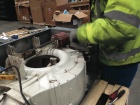ABB recycles record weight of drives

ABB reports that 31 t of drives were recycled in 2012, with over 96% by weight being recycled. Much of the copper, aluminium, circuit boards, steel and cables were recovered for further use. Although not required by the WEEE Directive, ABB offers this recycling scheme as a service to customers. The directive is currently being re-evaluated, with the possibility that many more electrical products, including drives, could come within its scope.
Drives are collected and recycled by certified waste-management company S2S. ABB drives and those of other manufacturers are collected through bins at the premises of ABB drives alliance members. Larger drives or large quantities of smaller drives can be collect from the end user.
Depending on size, a replacement drive could compensate for the carbon impact of its manufacture and disposal in just half a day. An ABB industrial drive could achieve lifetime savings of around 7500 MWh, or 3800 t of CO2 emissions.
Alan Dukinfield of S2S says, ‘ABB and S2S have been running the recycling scheme for many years, and no-one else is running a similar scheme on this level. If drives do come under the WEEE Directive, drive users can be assured that we have the capacity to recycle all their waste drives.’








